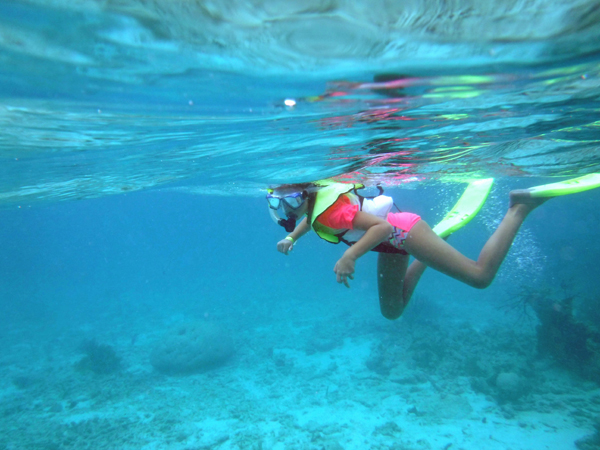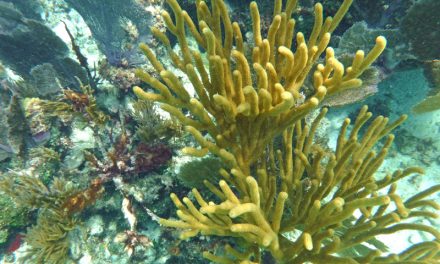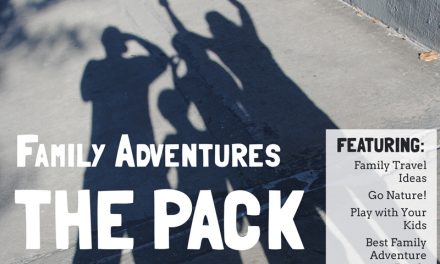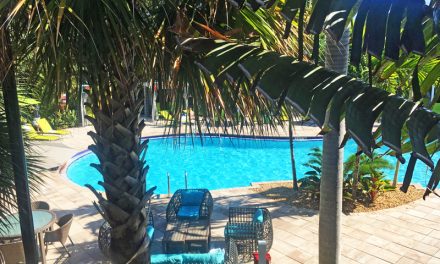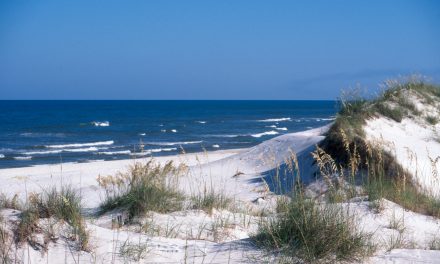When people think of outdoors adventures in the USA, they probably think of the mountains or the vast national parks of the American West. But there are plenty of family outdoors adventures in Florida. Yes, it’s (mostly) flat. Florida sticks out into the ocean, so it’s not exactly on the way to anywhere else. Its unique geography and topology, however, make for a standout adventure for families, in a state that’s already family-friendly.
Whether you’re in the neighborhood on your way to or from the theme parks, want your pack to do something new, or you just want to go somewhere that’s not icy, check out these top family outdoors adventures in Florida.
1. Take an airboat tour in the Everglades. The Everglades is a river of grass, so famously stated by late activist Marjory Stoneman Douglas, and there are miles of it in southern Florida. (There are other freshwater marshes in other parts of the state that may be called “Everglades.” People use airboats there, too.) To get around — or rather, over — the tall grasses, it’s common to see airboats propelled by large fans to scoot across the water. Many people use them for fishing. On an airboat ride, you’ll get to see the marsh up close and may even see wildlife like alligators and birds. The airboat captain/tour guide may tell you some history and fun facts about the environment. The nice thing about an airboat ride is the whole family, from babies to grandparents, can come on board. The downside is airboats are loud. You may be given earplugs or or ear protection, but be prepared for some noise. You’ll typically find airboat tours along the edges of the Everglades, such as near Fort Lauderdale, Miami, and Naples. Be wary if your tour guide feeds the alligators; feeding or harassing gators in Florida is illegal.
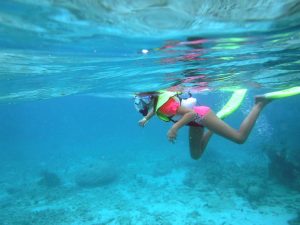
Snorkeling the coral reef is a unique family outdoors adventure in Florida
2. Snorkel or dive the coral reef. Florida has the only coral reef system in North America. Your family can snorkel in the Florida Keys just offshore the island chain. There are several tour boats in the Keys that will take you and your family to a good snorkeling or diving spot. Children as young as 10 can take classes and learn how to dive to become PADI certified for open water diving. If your kids (or you!) aren’t ready for that, they might be ready for snorkeling, which any swimmer can do with a mask, snorkel, and fins. For a unique adventure, take your family to snorkel in the Dry Tortugas, a collection of islands 70 miles west of Key West. Dry Tortugas National Park protects the islands for nesting shorebirds, sea turtles, and other marine life. There is also a Civil War-era fort to visit on Garden Key, where the tour boat will take you to snorkel. You can also plan to camp on Garden Key, if you don’t mind the absence of fresh water (the reason for the name “Dry” Tortugas). Most snorkel tours are full-day boat excursions that begin in the morning.
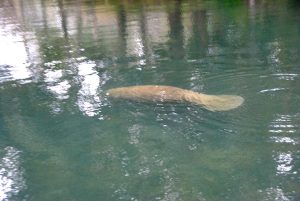
Manatees enjoy Florida’s freshwater springs
3. Swim in the freshwater springs. Florida has a slew of freshwater springs that are open to the public for swimming, snorkeling, and diving — and many springs create spring runs, or rivers, which are beautiful for canoeing, kayaking, or paddleboarding. Florida has more first-magnitude springs than any other state. (Magnitude is the measure of how much water a spring pumps out, with first magnitude being the most water.) You’ll find springs mainly in northern and central Florida. Springs maintain an even temperature year-round that lets you cool off in the summer and provides warmth for manatees in winter, which visit springs when the ocean turns too cold. When manatees are present (generally November-March), springs may be closed to people, like at Blue Spring State Park. You can still stand near the spring to look at it and any manatees that might be there. You can also view manatees from your boat in the river. Many people enjoy tours that allow them to swim and snorkel with manatees, which are a threatened species on the Endangered Species List. If you have any encounters with these marine mammals, follow the manatee manners.
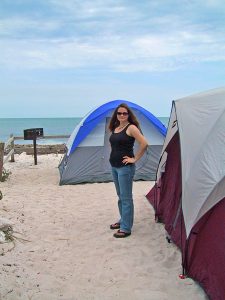
You can camp pretty darn close to the beach at some Bahia Honda State Park campsites
4. Camp on the beach. There are campgrounds in Florida where you can camp near the beach. Then there are places where you can actually camp on the sand. Check out Red Coconut RV Park in Fort Myers, which has some beach sites and others near the beach. If you won’t miss water or electricity, you can pitch a tent and enjoy oceanfront property for the night at Anclote Key State Park, Gulf Islands National Seashore, and Rookery Bay National Estuarine Research Reserve. (All are sites you have to take a boat to get to.) Many Florida state parks with beaches have campgrounds, although you will probably have to plan ahead to reserve a campsite there. For a unique camping experience, stay overnight at Cayo Costa State Park. Accessible only by boat, it offers cabins and campsites without amenities, although there is a restroom with cold-water showers.
5. Hike the Florida Trail. Did you know there’s a hiking trail that goes through the state of Florida? It could take months to through-hike the state, but your family might settle for backpacking through portions of it. Even if you don’t want to hike the whole trail, it provides a quality wilderness experience for those who want to get away from it all. Do a day hike, or plan ahead for an overnight stay along the trail.
The weather makes family outdoors adventures in Florida possible nearly year-round — just be careful in the summer to not overdo it in the extreme heat and humidity of the afternoon, and take precautions against biting insects.

